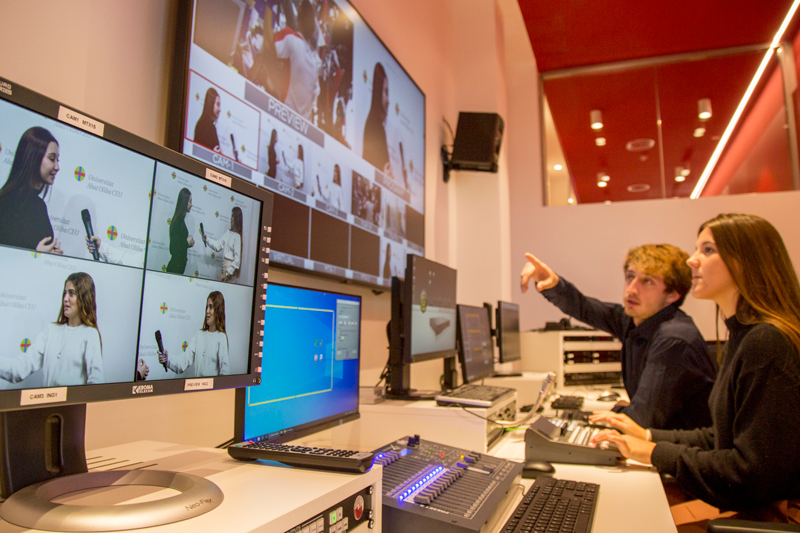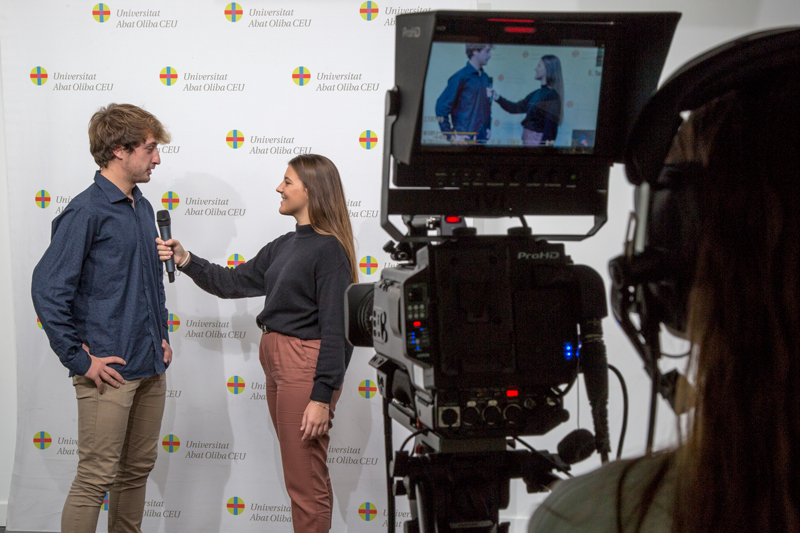🎓 Màster de Formació Permanent en Periodisme Esportiu | Universitat Abat Oliba CEU
Màster de Formació Permanent en Periodisme Esportiu
Title
Specialization Diploma in Prompt for Artificial Intelligence
Academic area
Communication
Length
4 months
Credits
30 ECTS
Format
Blended
Language
Spanish
Student profile
University degree or equivalent.
Admissions and enrolment
Applying for access via the website, sending documentation and formalizing admission to the University.
Why study at the UAO CEU?
Study Plan
FUNDAMENTALS
IN-DEPTH TRAINING AND SPECIALIZATION
APPLICATION AND PROJECTS
SPECIALIZATION AND DISSERTATION
Internships and career opportunities 
INTERNSHIPS AND CAREER OPPORTUNITIES
As part of their training, students studying the Specialist Diploma in Prompt for Artificial Intelligence will have to carry out curricular professional internships, guaranteed by the University itself, in companies linked to the technology sector, communication analysis and content creation. Students will have to take these internships in order to be awarded the official qualification.
Taking this program enables graduates to become part of leading professional teams and opens up possibilities of employment in this developing sector.
Students who obtain the Specialist Diploma in Prompt for Artificial Intelligence from the Abat Oliba CEU University can develop their profession in the following areas:
-
You can specialize in the creation and improvement of natural language models, using prompts effectively for specific tasks such as text generation, machine translation and language comprehension.
-
Work on the development of algorithms and NLP systems that harness prompts to improve the comprehension and generation of text by machines.
-
Use your knowledge to design and improve virtual assistants and chatbots that respond more effectively to prompt-based commands and questions.
-
Apply natural language processing techniques to analyse large text datasets, extracting valuable information and patterns that can benefit businesses.
-
Work on the design and development of applications that integrate prompt-based artificial intelligence functionalities, such as recommendation applications, sentiment analysis, or automatic response systems.
-
Focus on text data analysis, using prompts to improve the quality of predictive models and machine learning.
-
Provide advice to companies on how to implement effective natural language processing strategies using prompts, and how to make the most of these technologies in their operations.
-
Contribute to the research and development of new techniques and approaches related to the use of prompts in artificial intelligence and natural language processing.
-
Set up your own business to provide innovative prompt-based solutions to solve specific problems in the field of artificial intelligence and NLP.
TOTAL AMOUNT
€4,695 *
*Current price for the 2024-25 academic year
The academic fees correspond solely and exclusively to the provision of the teaching service of the degree enrolled on, this being the only service corresponding to the payment of those fees. By enrolling, the student consents and accepts that the teaching, tutorials, internships and evaluation tests may be in-person or remote (when the competent authorities so require, either directly or indirectly).
The obligation to pay in full the aforementioned fees will still apply even in the event that, for reasons beyond the University's control, some of the training activities included in the degree cannot be carried out according to the teaching schedule established at the beginning of the academic year. Should this occur, the University will guarantee the student that said activity will be rescheduled when possible, taking into consideration the interest of the students and the other academic criteria that may apply.
HOW TO PAY
Once the reservation has been formalized, the remaining amount of the course fees can be paid in the following ways:
Payment in full
Payment in full carries a 3 % discount on course fees.
Installments
In three installments per academic year.
Monthly payment
In 10 instalments through special bank financing with CaixaBank at 0% interest. This method also carries a 3 % discount on course fees.
Other financing agreements
With Banco Santander, CaixaBank, BBVA and Banc Sabadell. These also carry a 3 % discount on course fees.
Cancellation of reservation
Cancellation of reservation: Students will have until 21 of June to cancel their reserved place. Students can therefore reserve their places now with full guarantees*
*Deadline subject to changes in the official enrolment timetable.
FURTHER INFORMATION
Postgraduate and University Extension Programs
Bellesguard, 30. 08022 Barcelona
Tel. +34 93 253 72 03
[email protected]
Quality and standards 
STUDENT PROFILE
Applicants for the Specialist Diploma in Prompt for Artificial Intelligence must hold a Spanish or foreign higher university degree equivalent to a Bachelor’s degree in the Anglo-Saxon system.
This profile includes:
This training program does not require prior experience in the field of digital communication and new technologies.
OBJECTIVES
The subjects that make up the Specialist Diploma in Prompt for Artificial Intelligence respond to the need to train students, in an integrated and systematized way, in the professional techniques of application in the fields of communication and digital marketing.
The aim of this program is for students to gain a competitive advantage in the job market and develop an innovative, forward-looking academic career.
The Abat Oliba CEU University, through this diploma, provides cutting-edge training in artificial intelligence, as well as ensuring methodological training for the creation of digital content, specialist advice on the subject and management in the areas of communication and digital marketing in any company, including general media with a digital presence.
In this respect, this program has been developed from a theoretical-practical perspective to provide students with the resources and multimedia knowledge to address the challenges posed by the emerging digital environment.
MASTER'S PROGRAM COMPETENCES
RULES FOR CONTINUING STUDIES
MONITORING INDICATORS
DEGREE REPORT AND EVALUATION REPORT
MONITORING REPORTS
EVALUATION OF MONITORING REPORTS
ACCREDITATION REPORTS
Innovation Lab












|
|
Agenda and News
|
|


